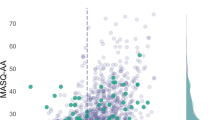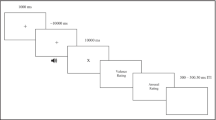Abstract
Worry is a key feature of anxiety disorders and is associated with biased attention with respect to threat and safety signals. The current study evaluated whether worry affects attentional processes during an emotional conditioning paradigm using event-related potentials. Participants high (n = 27) and low (n = 28) in worry completed an emotional S1-S2 task to evaluate fear acquisition, and a subsequent neutral S1-S2 task to evaluate extinction. The stimulus-preceding negativity (SPN) was used to evaluate preparatory resources for subsequent images, and the late positive potential (LPP) was used to evaluate emotional processing of threatening and neutral images. Results indicated that all participants displayed a more negative SPN for threatening images during the learning block, although across blocks worriers' SPN amplitude was not different for threat and safety cues. Additionally, high worriers displayed increased LPP for neutral images compared to low worriers. Results suggest that examining attentional processes during conditioning paradigms may increase our understanding of how worry affects fear learning.





Similar content being viewed by others
Data Availability
The datasets generated during and/or analysed during the current study are available from the corresponding author on reasonable request.
Notes
Contact the first author for the specific IAPS pictures used during the tasks.
References
Andor, T., Gerlach, A. L., & Rist, F. (2008). Superior perception of phasic physiological arousal and the detrimental consequences of the conviction to be aroused on worrying and metacognitions in GAD. Journal of Abnormal Psychology, 117, 193–205. https://doi.org/10.1037/0021-843X.117.1.193
Ansari, T. L., & Derakshan, N. (2011). The neural correlates of impaired inhibitory control in anxiety. Neuropsychologia, 49, 1146–1153. https://doi.org/10.1016/j.neuropsychologia.2011.01.019
Bacigalupo, F., & Luck, S. J. (2018). Event-related potential components as measures of aversive conditioning in humans. Psychophysiology, 55, e13015. https://doi.org/10.1111/psyp.13015
Borkovec, T. D., Alcaine, O., & Behar, E. S. (2004). Avoidance theory of worry and Generalized Anxiety Disorder. In R. G. Heimberg, D. Mennin, & C. Turk (Eds.), Generalized Anxiety Disorder: Advances in research and practice (pp. 77–108). Guilford Press.
Brunia, C. H. M. (1988). Movement and stimulus preceding negativity. Biological Psychology, 26, 165–178. https://doi.org/10.1016/0301-0511(88)90018-X
Brunia, C. H. M., de Jong, B. M., van den Berg-Lenssen, M. M., & Paans, A. M. (2000). Visual feedback about time estimation is related to a right hemisphere activation measured by PET. Experimental Brain Research, 130, 328–337. https://doi.org/10.1007/s002219900293
Brunia, C. H. M., Hackley, S. A., van Boxtel, G. J. M., Kotani, Y., & Ohgami, Y. (2011). Waiting to perceive: Reward or punishment? Clinical Neurophysiology, 122, 858–868. https://doi.org/10.1016/j.clinph.2010.12.039
Brunia, C. H. M., van Boxtel, G. J. M., & Böcker, K. B. E. (2012). Negative slow waves as indices of anticipation: The bereitschaftspotential, the contingent negative variation, and the stimulus-preceding negativity. In S. J. Luck & E. S. Kappenman (Eds.), The Oxford Handbook of Event-related Potentials (pp. 189–208). Oxford University Press.
Burkhouse, K. L., Woody, M. L., Owens, M., & Gibb, B. E. (2015). Influence of worry on sustained attention to emotional stimuli: Evidence from the late positive potential. Neuroscience Letters, 588, 57–61. https://doi.org/10.1016/j.neulet.2014.11.006
Corbetta, M., & Shulman, G. L. (2002). Control of goal-directed and stimulus-driven attention in the brain. Nature Reviews Neuroscience, 3, 201–215. https://doi.org/10.1038/nrn755
Craske, M. G., Rauch, S. L., Ursano, R., Prenoveau, J., Pine, D. S., & Zinbarg, R. E. (2009). What is an anxiety disorder? Depression and Anxiety, 26, 1066–1085. https://doi.org/10.1002/da.20633
Cuthbert, B. N., Schupp, H. T., Bradley, M. M., Birbaumer, N., & Lang, P. J. (2000). Brain potentials in affective picture processing: Covaration with autonomic arousal and affective report. Biological Psychology, 52, 91–111. https://doi.org/10.1016/S0301-0511(99)00044-7
De Berardis, D., Fornaro, M., Valchera, A., Cavuto, M., Perna, G., … Tomasetti, C. (2018). Eradicating suicide at its roots: preclinical bases and clinical evidence of the efficacy of ketamine in the treatment of suicidal behaviors. International Journal of Molecular Science, 19, 2888. https://doi.org/10.3390/ijms19102888
Delorme, A., & Makieg, S. (2004). EEGLAB: An open source toolbox for analysis of single-trial EEG dynamics. Journal of Neuroscience Methods, 134, 9–21. https://doi.org/10.1016/j.jneumeth.2003.10.009
Faul, F., Erdfelder, E., Lang, A. G., & Buchner, A. (2007). G*Power 3: A flexible statistical power analysis program for the social, behavioral and biomedical sciences. Behavioral Research Methods, 39, 175–191. https://doi.org/10.3758/BF03193146
Gazendam, F. J., & Kindt, M. (2012). Worrying affects associative fear learning: A startle fear conditioning study. PLoS ONE, 7, e34882. https://doi.org/10.1371/journal.pone.0034882
Gillis, M. M., Haaga, D. A. F., & Ford, G. T. (1995). Normative values for the Beck Anxiety Inventory, Fear Questionnaire, Penn State Worry Questionnaire, and Social Phobia and Anxiety Inventory. Psychological Assessment, 7, 450–455. https://doi.org/10.1037/1040-3590.7.4.450
Grant, D. M., Judah, M. R., White, E. J., & Mills, A. C. (2015). Worry and discrimination of threat and safety cues: An event-related potential investigation. Behavior Therapy, 46, 652–660.
Grillon, C., & Ameli, R. (2001). Conditioned inhibition of fear-potentiated startle and skin conductance in humans. Psychophysiology, 38, 807–815. https://doi.org/10.1111/1469-8986.3850807
Hajcak, G., Dunning, J. P., & Foti, D. (2009). Motivated and controlled attention to emotion: Time-course of the late positive potential. Clinical Neurophysiology, 120, 505–510. https://doi.org/10.1016/j.clinph.2008.11.028.
Hirsch, C. R., & Mathews, A. (2012). A cognitive model of pathological worry. Behaviour Research and Therapy, 50, 636–646. https://doi.org/10.1016/j.brat.2012.06.007
Holmes, A., Nielsen, M. K., & Green, S. (2008). Effects of anxiety on the processing of fearful and happy faces: An event-related potential study. Biological Psychology, 77, 159–173. https://doi.org/10.1016/j.biopsycho.2007.10.003
Joos, E., Vansteenwegen, D., & Hermans, D. (2012). Worry as a predictor of fear acquisition in a nonclinical sample. Behavior Modification, 36, 723–750. https://doi.org/10.1177/0145445512446477
Judah, M. R., Grant, D. M., Mills, A. C., & Lechner, W. V. (2013). The neural correlates of impaired attentional control in social anxiety: An ERP study of inhibition and shifting. Emotion, 13, 1095–1106. https://doi.org/10.1037/a0033531
Judah, M. R., Grant, D. M., & Carlisle, N. B. (2016). Selective attention and working memory maintenance for threatening faces in social anxiety: An ERP study. Cognitive, Affective, and Behavioral Neuroscience, 16, 393–405.
Kotani, Y., Hiraku, S., Suda, K., & Aihara, Y. (2001). Effect of positive and negative emotion on stimulus-preceding negativity prior to feedback stimuli. Psychophysiology, 38, 873–878. https://doi.org/10.1111/1469-8986.3860873
Lang, P. J., Bradley, M. M., & Cuthbert, B. N. (2005). International affective picture system (IAPS): Affective ratings of pictures and instruction manual. University of Florida.
Lissek, S., Powers, A. S., McClure, E. B., Phelps, E. A., Woldehawariate, G., Grillon, C., & Pine, D. S. (2005). Classical fear conditioning in the anxiety disorders: A meta-analysis. Behaviour Research and Therapy, 43, 1391–1424. https://doi.org/10.1016/j.brat.2004.10.007
Lissek, S., Kaczkurkin, A. N., Rabin, S., Geraci, M., Pine, D. S., & Grillon, C. (2014). Generalized anxiety disorder is associated with overgeneralization of classically conditioned fear. Biological Psychiatry, 75, 909–915. https://doi.org/10.1016/j.biopsych.2013.07.025
Lopez-Calderson, J., & Luck, S. J. (2010). The ERPLAB Toolbox (Version 3). Retrieved from http://erpinfo.org/erplab.
Luck, S. J. (2014). An introduction to the event-related potential technique. MIT Press.
MacNamara, A., & Barley, B. (2018). Event-related potentials to threat of predictable and unpredictable shock. Psychophysiology, 55, e13206. https://doi.org/10.1111/psyp.13206
MacNamara, A., & Hajcak, G. (2010). Distinct electrocortical and behavioral evidence for increased attention to threat in generalized anxiety disorder. Depression and Anxiety, 27, 234–243. https://doi.org/10.1002/da.20679
MacNamara, A., & Proudfit, G. H. (2014). Cognitive load and emotional processing in Generalized Anxiety Disorder: Electrocortical evidence for increased distractibility. Journal of Abnormal Psychology, 123, 557–565. https://doi.org/10.1037/a0036997
Melynyte, S., Wang, G. Y., & Griskova-Bulanova, I. (2018). Gender effects on auditory P300: A systematic review. International Journal of Psychophysiology, 133, 55–65. https://doi.org/10.1016/j.ijpsycho.2018.08.009
Meyer, T. J., Miller, M. L., Metzger, R. L., & Borkovec, T. D. (1990). Development and validation of the Penn State Worry Questionnaire. Behaviour Research and Therapy, 28, 487–495. https://doi.org/10.1016/0005-7967(90)90135-6
Moran, T. P., Jendrusina, A. A., & Moser, J. S. (2013). The psychometric properties of the late positive potential during emotion processing and regulation. Brain Research, 1516, 66–77. https://doi.org/10.1016/j.brainres.2013.04.018
Moser, J. S., Krompinger, J. W., Dietz, J., & Simons, R. F. (2009). Electrophysiological correlates of decreasing and increasing emotional responses to unpleasant pictures. Psychophysiology, 46, 17–27. https://doi.org/10.1111/j.1469-8986.2008.00721.x
Moser, J. S., Hartwig, R., Moran, T. P., Jendrusina, A. A., & Kross, E. (2014). Neural markers of positive reappraisal and their associations with trait appraisal and worry. Journal of Abnormal Psychology, 123, 91–105. https://doi.org/10.1037/a0035817
Newman, M. G., & Llera, S. J. (2011). A novel theory of experiential avoidance in generalized anxiety disorder: A review and synthesis of research supporting a contrast avoidance model of worry. Clinical Psychology Review, 31, 371–382. https://doi.org/10.1016/j.cpr.2011.01.008
Orsolini, L., Latini, R., Pompili, M., Serafini, G., Volpe, U., … Di Giannantonio, M. (2020). Understanding the complex of suicide in depression: from research to clinics. Psychiatry Investigation, 17, 207-221. https://doi.org/10.30773/pi.2019.0171
Otto, M. W., Leyro, T. M., Christian, K., Deveney, C. M., Reese, H., Pollack, M. H., & Orr, S. P. (2007). Prediction of “fear” acquisition in healthy control participants in a de novo fear-conditioning paradigm. Behavior Modification, 31, 32–51. https://doi.org/10.1177/0145445506295054
Phelps, E. A., Delgado, M. R., Nearing, K. I., & LeDoux, J. E. (2004). Extinction learning in humans: Role of the amygdala and vmPFC (2004). Neuron, 43, 897–905. https://doi.org/10.1016/j.neuron.2004.08.042
Pitman, R. K., & Orr, S. P. (1986). Test of the conditioning models of neurosis: Differential aversive conditioning of angry and neutral facial expressions in anxiety disorder patients. Journal of Abnormal Psychology, 95, 208–213. https://doi.org/10.1037/0021-843X.95.3.208
Poli, S., Sarlo, M., Bortoletto, M., Buodo, G., & Palomba, D. (2007). Stimulus-preceding negativity and heart rate changes in anticipation of affective pictures. International Journal of Psychophysiology, 65, 32–39. https://doi.org/10.1016/j.ijpsycho.2007.02.008
Ruscio, A. M., Borkovec, T. D., & Ruscio, J. (2001). A taxometric investigation of the latent structure of worry. Journal of Abnormal Psychology, 110, 413–422. https://doi.org/10.1037/0021-843X.110.3.413
Schupp, H. T., Stockburger, J., Codispoti, M., Junghöfer, M., Weike, A. I., & Hamm, A. O. (2007). Selective visual attention to emotion. Journal of Neuroscience, 27, 1082–1089. https://doi.org/10.1523/JNEUROSCI.3223-06.2007
Smith, J. L., Johnstone, S. J., & Barry, R. J. (2007). Response priming in the Go/NoGO task: The N2 reflects neither inhibition nor conflict. Clinical Neurophysiology, 118, 343–355. https://doi.org/10.1016/j.clinph.2006.09.027
Tabachnick, B. G., & Fidell, L. S. (2007). Experimental design using ANOVA. Thomson.
Tanovic, E., Pruessner, L., & Joormann, J. (2018). Attention and anticipation in response to varying levels of threat: An ERP study. Cognitive, Affective, & Behavioral Neuroscience, 18, 1207–1220. https://doi.org/10.3758/s13415-018-0632-2
Thayer, J. F., Friedman, B. H., Borkovec, T. D., Johnsen, B. H., & Molina, S. (2000). Phasic heart period reactions to cued threat and nonthreat stimuli in generalized anxiety disorder. Psychophysiology, 37, 361–368. https://doi.org/10.1111/1469-8986.3730361
van Boxtel, G. J. M., & Böcker, K. B. E. (2004). Cortical measures of anticipation. Journal of Psychophysiology, 18, 61–71. https://doi.org/10.1027/0269-8803.18.23.61
Weinberg, A., & Hajcak, G. (2011a). Electrocortical evidence for vigilance-avoidance in Generalized Anxiety Disorder. Psychophysiology, 48, 842–851. https://doi.org/10.1111/j.1469-8986.2010.01149.x
Weinberg, A., & Hajcak, G. (2011b). The late positive potential predicts subsequent interference with target processing. Journal of Cognitive Neuroscience, 23, 2994–3007. https://doi.org/10.1162/jocn.2011.21630
White, E. J., & Grant, D. M. (2017). Electrocortical consequences of image processing: The influence of working memory load and worry. Psychiatry Research: Neuroimaging, 261, 1–8. https://doi.org/10.1016/j.psychresns.2017.01.003
Author information
Authors and Affiliations
Corresponding author
Ethics declarations
Conflict of Interest
On behalf of all authors, the corresponding author states that there is no conflict of interest.
Additional information
Publisher's Note
Springer Nature remains neutral with regard to jurisdictional claims in published maps and institutional affiliations.
Rights and permissions
About this article
Cite this article
Grant, D.M., Judah, M.R., White, E.J. et al. Electrocortical evidence of biased attention to safety cues and stimuli among worriers. Curr Psychol 42, 20606–20615 (2023). https://doi.org/10.1007/s12144-022-03139-2
Accepted:
Published:
Issue Date:
DOI: https://doi.org/10.1007/s12144-022-03139-2




